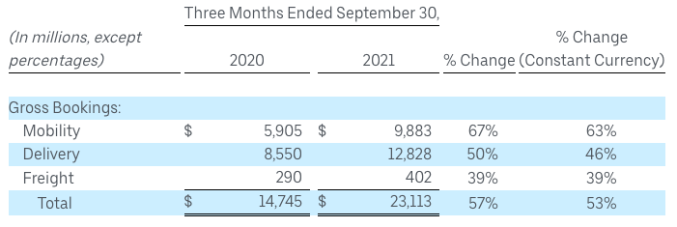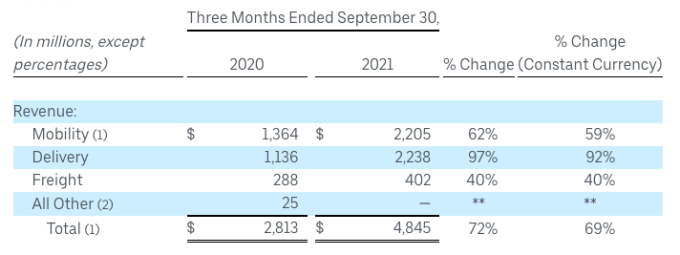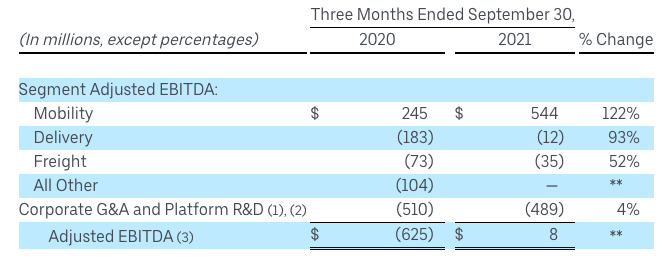Today after the bell American ride-hailing giant Uber reported its third-quarter financial results. Critically, the long-unprofitable company managed to squeak $8 million worth of adjusted EBITDA — a very modified profit metric — while still posting net losses of more than $2 billion.
The adjusted-profit result comes days after Lyft, Uber’s domestic rival, also recently managed the financial feat.
In the third quarter, Uber’s gross bookings (or the value of all goods and services that flowed through its platform) totaled $23.1 billion, up 57% on a year-over-year basis. That figure translated to revenues of $4.8 billion, up 72% compared to the year-ago quarter. From that revenue figure Uber turned in a net loss of $2.4 billion, a figure inclusive of “a $2.0 billion net headwind” from the company revaluing its equity holdings in other companies.
The company’s unadjusted per-share net losses came to $1.28, or a bit more than double the $0.62 it lost on a per-share basis in the year-ago third-quarter.
Analysts had expected the ride-hailing company to report a $0.33 per-share loss against revenues of $4.42 billion. Shares of the company are off around 5% in after-hours trading.
Before we get into segment performance, Uber indicated that it expects gross bookings of between $25 billion and $26 billion in the fourth quarter, leading to adjusted EBITDA of $25 to $75 million. Normally we’d mock a company of Uber’s scale and age for still forecasting with kids-table metrics like adjusted EBITDA instead of grown-up stats like GAAP net income. But as Uber has long promised investors that it would claw its way to the modified profit threshold this year, the guidance is worth noting.
Segment performance
Thinking broadly, Uber’s food delivery business drives far more of its total gross bookings than its ride-hailing business these days. In fact, it may be time to consider Uber more a food-delivery company than a taxi app.
Regardless, here’s the company’s segment breakdown in terms of gross spend:

Image Credits: Uber
It is notable that ride-hailing is growing more quickly lately than food delivery at the company, but the swap makes some sense. Uber Eats grew like a weed during the pandemic, while moving people about lost its luster while folks stayed home. Now, with COVID abating in some markets, things are flipping back around.
Recall that Uber generates more revenue from rides than food, leading to the following top-line results from the above gross bookings:

Image Credits: Uber
Near revenue-parity from taxi service and on-demand noshing feels notable, as does Uber’s Freight business generating enough top line for us to begin considering it a material piece of the company’s larger operational outcomes.
Now, to profitability, or, really, adjusted EBITDA results for each group:

Image Credits: Uber
As you can see, Uber has managed to drive its food business to nigh-adjusted breakeven status. That’s material progress compared to where the product was last year. And Uber’s ride business mostly canceled out its adjusted corporate losses. In sum, the company stuck a toe into adjusted-profitability land, posting $8 million worth of adjusted EBITDA, as we noted up top.
What is impressive, frankly, is how far Uber managed to improve its adjusted EBITDA metric in just one year.
Taking into account all costs and expenses, Uber’s GAAP operating profit, however, came to -$572 million. And once interest costs and other expenses were taken into account, the former startup lost $2.44 billion in the period, or around $800 million per month. What drove the massive gap at Uber between its operating losses and its GAAP losses? Falling value of its investments. Per the company:
During the three and nine months ended September 30, 2021, unrealized loss on debt and equity securities, net, primarily represents a $3.2 billion and $1.7 billion net unrealized loss, respectively on our Didi investment, partially offset by a $994 million unrealized gain on our Zomato investment recognized during the third quarter of 2021, a $102 million and $573 million unrealized gain, respectively on our Aurora Investments, as well as a $73 million and $56 million net unrealized gain, respectively on our other investments in securities accounted for under the fair value option.
Or more simply, the Chinese government’s annoyance with Didi led to Uber’s net income winding up in the shitter.
Summing, Uber remains unprofitable, but it is recovering from the pandemic and has managed, at last, to post adjusted incomes. Now let’s see it get to real breakeven.

